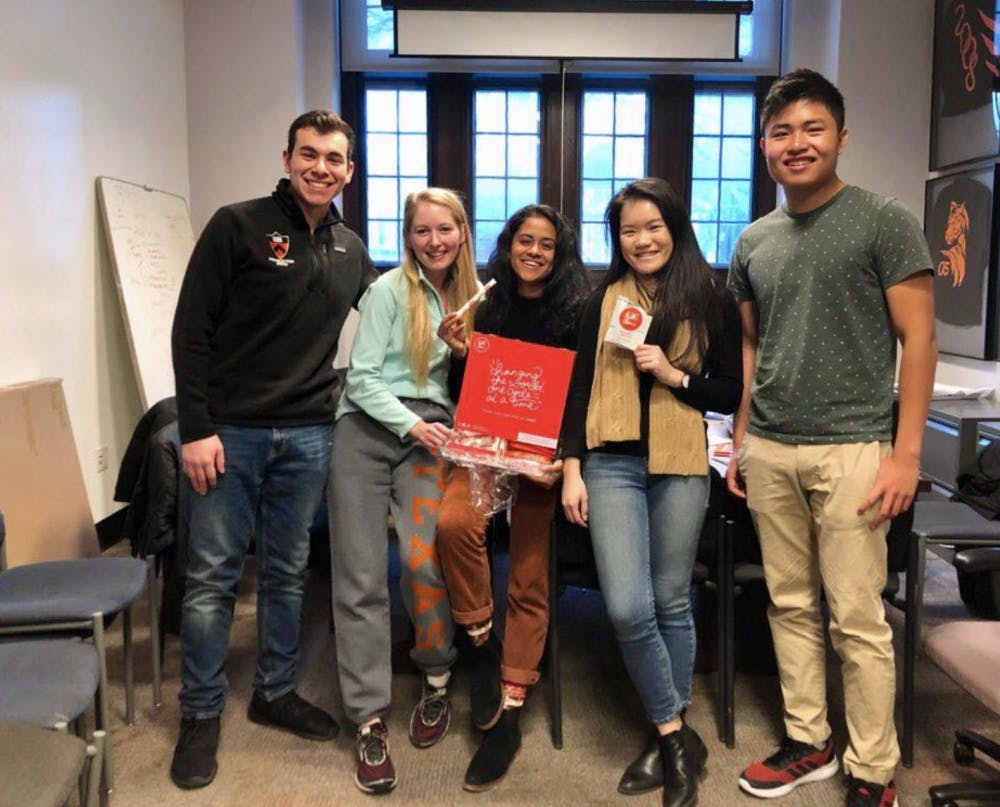Next fall, 56 bathrooms in seven different buildings on campus will feature free menstrual products. This marks the first stage implementation of the Menstrual Products Task Force’s long-term project to provide free products on campus.
The bathrooms included in the first stage of the rollout will include women’s bathrooms, men’s bathrooms, and gender neutral bathrooms. The products will be in the Frist Campus Center, the Friend Center, Frick Chemistry Lab, Firestone, Lewis, Dillon, and the New Lewis Center.
The Menstrual Products Taskforce is a group of students led by Preeti Iyer ’20, Katherine Fleming ’19, Wendy Zhao ’19, and Sarah Pacilio ’19 that has been working for the past two years to make this rollout possible. Formerly under the leadership of USG Senator Cailin Hong ’17, the taskforce is technically under the umbrella of USG, but has operated fairly independently, working directly with Vice President for Student Life Rochelle Calhoun and various members of the maintenance staff, most recently Richard Brown.
According to the task force’s official project proposal, their aim is to help students live a healthier, more dignified lifestyle and keep students from sacrificing other material needs, or missing class, to be able to obtain menstrual products.
A number of students have supported the campaign with testimonials about struggling to afford these products or having unpleasant experiences in which they need them unexpectedly throughout the day. In the “Why This Would Benefit Princeton” section of the proposal, the taskforce also said that this effort fits into the University’s recent efforts to be more accessible and inclusive.
The task force hopes that after the first stage implementation the campaign can expand to include even more bathrooms.The bathrooms in the first stage were chosen strategically to accommodate students in different areas of campus.
“We laid out a map of campus and said ‘We want people to be able to go to each corner of campus and not end up stranded,’” Katherine Fleming ’19 said. “So even if there can’t be something in every building at this point, if you’re in Fine Hall and you’re really in a bind, rather than running back to your room you can pop over to Lewis.”
The first stage implementation will build upon the pilot program which was run on campus two years ago. The leaders of the task force emphasized that they have tried to make their efforts as gender inclusive as possible.

“It’s important to realize that this whole dialogue around menstrual equity, providing menstrual products, is really from a place of making Princeton a more equitable campus, making Princeton a place where any student feels comfortable,” Preeti Iyer ’20 said.
“We don’t want to have these core ideas of equity, but at the same time marginalize certain groups of students by only providing products in female restrooms because the fact is that at Princeton University we do have menstruators who do identify as male or who use male restrooms.”
The task force also strives to use gender neutral language and think more broadly about an inclusive sense of menstrual equity.
“While we do symbolically link this with the fiftieth anniversary of undergraduate women coming to Princeton, as a really exciting and significant moment to be doing this, we also recognize that this is not about women. This is about creating a campus climate that is sensitive on issues of gender, on issues of health, and on issues of dignity,” Fleming said. “It’s not just about making campus better for women. It’s about making campus better for everyone.”

According to students on the taskforce, their biggest challenges were navigating University bureaucracy and convincing the administration that free menstrual products would be an important addition to campus life.
“At first, I think we thought we had to try to convince the administrators that free menstrual products needed to be provided on campus and we focused a lot of our efforts on trying to demonstrate that,” Wendy Zhao ’19 wrote in an email. "Once they understood the need, we eventually transitioned to demonstrating the feasibility of implementing free menstrual products, which meant contacting vendors, determining costs, funding sources, etc.”
The task force’s leaders said they were often told they should be speaking to a different member of the administration, or a different member of the facilities staff, and felt that they had to work hard to stay on the administration’s agenda.
“We ran into a lot of red tape with the administration, and saw firsthand how opaque Princeton University’s bureaucracy can be,” Sarah Pacilio ’19 wrote in an email. “However, after a lot of hard work and discussions with members of the administration, we are thrilled with the outcome – the successful implementation of this campaign.”
The task force worked to determine the best vendor from economic, environmental, and equity standpoints. The student leaders wanted to work with Aunt Flow, an environmentally friendly menstrual products start-up, and were pleased that Aunt Flow is the vendor that the University eventually approved.
“For every 10 tampons and pads sold, we donate one to a menstruator living in poverty in the USA through our beneficiary organization, Period.org,” Claire Coder, Founder and CEO of Aunt Flow, wrote in an email. “We are thrilled that Princeton is working with us to change the world, one 'cycle' at a time.”
Other students on campus also connected with Coder through avenues like Company of Female Founders and other entrepreneurship-focused groups on campus.
Vice President Calhoun thanked the task force for their devotion to student needs and their persistence throughout the process.
“I really appreciate the way the students who conceived of the program really worked earnestly to test the program with their peers and hear their peers’ needs,” Vice President Calhoun said.
Richard Brown deferred comments to Vice President Calhoun.
The Menstrual Products Task Force held a Menstrual Products Pre-Launch Party last Saturday to celebrate the rollout of the first stage implementation next fall.








